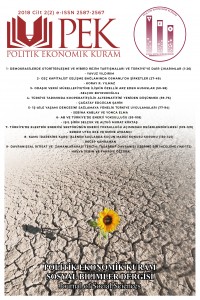Abstract
Uluslararası literatürde
üzerinde birçok çalışma yapılmış olan enerji yoksulluğu kavramı, Türkiye’de de
son dönemde dikkat çekmeye başlamıştır. Bu bağlamda bu çalışmada hanehalkının
karşı karşıya kaldığı enerji yoksulluğunun bir ayağını oluşturan elektrik
enerjisine ait enerji yoksulluğu profili Türkiye için çizilmeye çalışılmış
bununla birlikte genel olarak Türkiye’deki elektrik enerjisi sektörünün durumu
da incelenmiştir. Literatürde enerji yoksulluğunu ölçme yöntemlerinden miktar
ve gelirin oranı yaklaşımları ile Türk hanehalklarının enerji yoksulluğu
profili analiz edilmeye çalışılarak, Türkiye için mevcut durumun ne olduğu ele
alınmıştır. Bu sayede enerji yoksulluğu ile mücadele için politika
üreticilerine ve enerji yoksulluğu üzerinde çalışma yapmak isteyenlere katkı
sağlanması çalışmanın amacını oluşturmaktadır.
References
- Bağdadioğlu, N., Başaran, A., Kalaycıoğlu, S., Pınar, A., (2009). Kamu Kolaylıkları Yönetişiminde Yoksulluğun Dikkate Alınması. Ankara: Birleşmiş Milletler Kalkınma Programı, Hacettepe Üniversitesi Piyasa Ekonomisini ve Girişimciliği Geliştirme Merkezi, Sözkesen Matbaacılık.
- Bağdadioğlu, N., Odyakmaz, N. (2009). Turkish electricity reform. Utilities Policy, 17, 144-152.
- Boardman, B. (2010). Fixing Fuel Poverty Challenges and Solutions. London: Earthscan
- Buzar, S. (2007). The ‘hidden’ geographies of energy poverty in post-socialism: Between institutions and households. Geoforum (38), 224-240.
- Day, R., Walker, G., Simock, N. (2016). Conceptualising Energy Use and Energy Poverty Using a Capabilities Framework. Energy Policy, 93, 255-264.
- Eke, E. U. (2012). Enerji Yoksulluğunun Giderilmesine Yönelik Sosyal Politikalar, Ankara.
- Enerji Enstitüsü. (2012). Elektrik birim fiyatları karşılaştırması. Erişim 16 Haziran 2012, http://enerjienstitusu.com/2011/01/11/2011-yili-yeni-elektrik-tarifesi/EPDK. (2017). Elektrik Piyasası Raporu 2017. Ankara: Enerji Piyasası Düzenleme Kurumu.
- Erdoğdu, E. (2005). Energy Market Reforms in Turkey: An economic analysis. Yüksek lisans tezi, University of Surrey School of Human Sciences, Surrey, UK.
- Fankhauser, S., Rodionova, Y., Falcetti, E. (2008). Utility Payments in Ukraine: Affordablity, subsides and arrears. London, UK: Centre for the Study of Economic and Social Change in Europe, Economics Working Paper No. 87.
- Foster, V., Yepes, T. (2006). Is Cost Recovery a Feasible Objective for Water and Electricity? The Latin American Experience. Washington, DC: World Bank Policy Research Working Paper 3943.
- Hills, J. (2011). Fuel Poverty: The problem and its measurement. London: Department of Energy and Climate Change.
- IEA. (2017). Key World Energy Statistics 2017. Paris: International Energy Agency.
- Khandker, S. R., Barnes, D. F., Samad H. A. (2010). Energy Poverty in Rural and Urban India: Are the Energy Poor Also Income Poor? Washington, DC: World Bank Agriculture and Rural Development Team.
- Modi, V., McDade, S., Lallement, D., Saghir, J. (2005). Energy Services for the Millennium Development Goals. New York: The International Bank for Reconstruction and Development, The World Bank and the United Nations Development Programme Publications.
- O’Connell, R. (2018). Families and Food in Hard Times: rising food poverty and the importance of children’s experiences. SPERI British Political Economy Brief No.33. Sheffield Political Economy Resarch Institute.
- Silva, P., Klytchniova, I., Radevic, D. (2007). Poverty and environmental impacts of electricity price reforms in Montenegro. Norfolk, UK: Center for Competition Policy Working Paper.
- Taleski, R. (2009). Electricity reform in the Republic of Macedonia. Utulities Policy, 17, 88-101.
- TEDAŞ. (2017). Türkiye Elektrik Dağıtım ve Tüketim İstatistikleri. Erişim 13 Mayıs 2018, http://www.tedas.gov.tr/29,Istatistiki_Bilgiler.html
- TEİAŞ. (2017). Türkiye Elektrik Dağıtım ve Tüketim İstatistikleri. Erişim 09 Haziran 2018, http://www.teias.gov.tr/istatistik2017/%C4%B0statistik%202010.htm
- Tennakoon, D. (2008). Energy Poverty: Estimating The Level Of Energy Poverty In Sri Lanka. Colombo: Practical Action South Asia.
- TÜİK(a). (2017). Türkiye Nüfus İstatistikleri Erişim 10 Mayıs 2018, http://www.tuik.gov.tr/PreTablo.do?alt_id=1059
- TÜİK(b). (2017). Haber Bülteni. 24646, Erişim 16 Mayıs 2018, file:///C:/Users/Humar/Downloads/%C4%B0statistiklerle_Aile_10.05.2017.pdf
- UN. (2017). World Statistics Pocketbook 2017. New York: United Nations.
- WHECA. (2000). Warm Homes and Energy Conservation Act. United Kingdom Legislation Chapter 31, Section 2. 24 November 2000. Erişim, 20 Mayıs 2018, http://www.legislation.gov.uk/ukpga/2000/31/section/2
- WBI. (2005). Introduction to Poverty Analysis. Washington, DC: World Bank Institute.
- WSP. (2017). World Statistics Pocketbook 2017 Edition. V, 41. New York, USA.
Details
| Primary Language | Turkish |
|---|---|
| Subjects | Economics |
| Journal Section | Makaleler |
| Authors | |
| Publication Date | December 31, 2018 |
| Published in Issue | Year 2018 Volume: 2 Issue: 2 |
Cited By
Energy Poverty and Its Effect on Economic Growth in Turkey
Hitit Sosyal Bilimler Dergisi
https://doi.org/10.17218/hititsbd.1478715
This work is licensed under a Creative Commons Attribution 4.0 International License.

